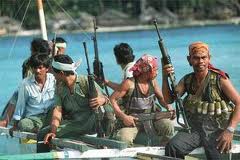 Yo-ho-ho, and a rum business at the Home Office
Yo-ho-ho, and a rum business at the Home Office
The Prime Minister’s new anti-pirate shipping guards scheme is designed to spare the blushes of the Royal Navy….and distract the electorate from the parlous state of our defence infrastructure
The Slog has learned from senior maritime vessel management sources that the Prime Minister’s announcement about guards on merchant ships is, in reality, a clever spin exercise to mask the helplessness of the Royal Navy.
With some fanfare yesterday, David Cameron announced that ships sailing under Britain’s flag will be permitted to carry armed guards on some perilous routes to combat the threat from pirates. Cameron told the BBC that Britain would be reversing its opposition to the use of weapons aboard ships, amid mounting concern about the risks of vessels and crew being seized by pirates — particularly off Somalia’s coast.
But while the Cabinet office ‘confirmed’ that the use of weapons on British-flagged ships is banned under firearms laws, most UK flag ships travelling anywhere within range of Somalian Pirates already carry armed guards. The Maritime and Coastguard Agency, which comes under the Department for Transport, has turned a blind eye to the practice for the last two years.....ever since the biggest British shipping company, Zodiac Maritime Agencies, had a ship pirated. ZMA's owners, Sammy and Idan Ofer, put armed guards aboard their hundred-strong fleet immediately after having to hand over a ransom.
However, what most observers haven’t realised is that the revised operation will be under the Home Office’s wing. This is idiotic, given that – as its name suggests – the Home Office controls security in the UK, not beyond its territorial waters.
“The Home Office’s knowledge of ships could be written on a postage stamp,” one source told The Slog, “What is really going on here is that the Royal Navy will be dropping all anti-pirate duties because their gas turbine ships are too expensive to keep at sea in the area."
The reason for this is easy to explain: the sailing range of a Royal Navy destroyer at economical speed is 4,000 miles – but only if it sails at an economical speed. The standard figure for most deep sea merchant ships is five times as much.
“The cost of fuel for [Royal Navy] gas turbines means they stay in port,” a senior authority on merchant vessels told me, “The Royal Navy is so strapped for cash, it can’t even afford to practice let alone get involved in serious operations. Such patrolling as gets done is down to the Royal Fleet Auxiliary, whose slightly more fuel-efficient ships are intended to act as tankers and general supply vessels to the Navy’s handful of remaining warships – because, being quasi-merchant ships, they have diesel engines.”
I could go into the process by which our magnificent Ministry of Defence plumped for gas turbines, but the nation’s blood pressure problem is bad enough already…so I won’t.
Effectively, David Cameron’s spin doctors have taken the hidden scandal of Royal Navy ships being expensively powered and hopelessly underfunded, and presented it as a ‘tough’ decision by the PM to take on Somali pirates. In reality, the new system is a replacement of British armed forces with vigilantes.
“We get our armed guards from a bunch called MAST - ex Naval officers employing ex Marines and Paras from an office in Stansted Airport," said a person close to the situation, "This company until recently provided British armed guards for, would you believe, Iranian shipping...although Ahmadinnejhad has since put a stop to it."
How often, these days, the truth is stranger than fiction.




